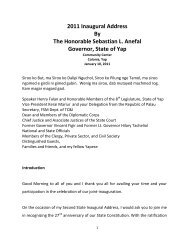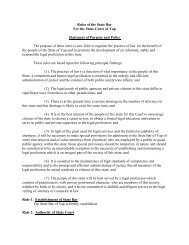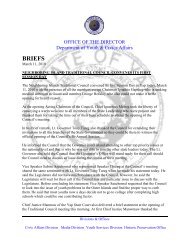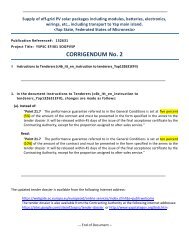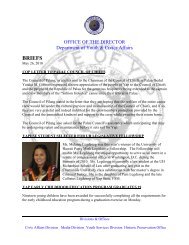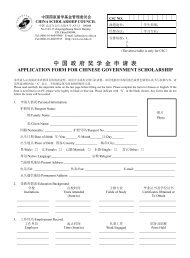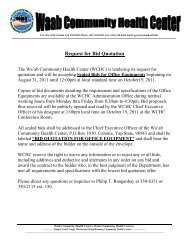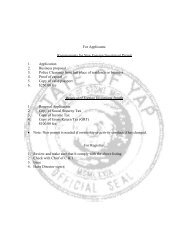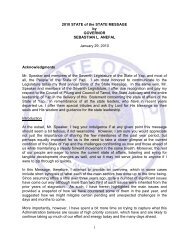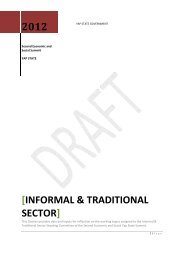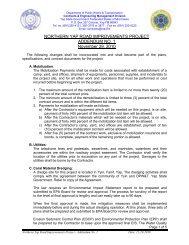RULES OF CIVIL PROCEDURE For the Trial Division of the Yap ...
RULES OF CIVIL PROCEDURE For the Trial Division of the Yap ...
RULES OF CIVIL PROCEDURE For the Trial Division of the Yap ...
Create successful ePaper yourself
Turn your PDF publications into a flip-book with our unique Google optimized e-Paper software.
(C) Sanctions. Failure <strong>of</strong> attorney or trial counselor for a party to file <strong>the</strong><br />
required memorandum <strong>of</strong> points and authorities may, in <strong>the</strong> discretion <strong>of</strong> <strong>the</strong> court,<br />
subject <strong>the</strong> defaulting counsel to <strong>the</strong> imposition <strong>of</strong> sanctions, including refusal by <strong>the</strong><br />
court to hear counsel at <strong>the</strong> hearing, postponement <strong>of</strong> <strong>the</strong> hearing until <strong>the</strong> memorandum<br />
is prepared and filed, waiver by <strong>the</strong> moving party <strong>of</strong> <strong>the</strong> motion, or consent to <strong>the</strong><br />
granting <strong>of</strong> <strong>the</strong> motion if counsel for <strong>the</strong> opposing party fails to file <strong>the</strong> memorandum <strong>of</strong><br />
points and authorities.<br />
(2) Unless o<strong>the</strong>rwise ordered by <strong>the</strong> court, parties must file an original and one<br />
copy <strong>of</strong> all documents filed with <strong>the</strong> court pursuant to <strong>the</strong>se rules. The rules applicable to<br />
captions, signing, and o<strong>the</strong>r matters <strong>of</strong> form <strong>of</strong> pleadings apply to all motions and o<strong>the</strong>r<br />
papers provided for by <strong>the</strong>se rules.<br />
(c) Demurrers, Pleas, Etc., Abolished. Demurrers, pleas, and exceptions for<br />
insufficiency <strong>of</strong> a pleading shall not be used.<br />
Comment: Rule 7 has been amended to reflect <strong>the</strong> elimination <strong>of</strong> <strong>the</strong> motion day.<br />
It has also been modified so that <strong>the</strong> Court need not hold a hearing on a motion unless a<br />
party requests one, so long as <strong>the</strong> Court does not issue an order pursuant to Rule 78.<br />
Rule 8. General Rules <strong>of</strong> Pleadings.<br />
(a) Claims for Relief. A pleading which sets forth a claim for relief, whe<strong>the</strong>r an<br />
original claim, counterclaim, cross-claim, or third-party claim, shall contain (1) a short<br />
and plain statement <strong>of</strong> <strong>the</strong> claim showing that <strong>the</strong> pleader is entitled to relief, and (2) a<br />
demand for judgment for <strong>the</strong> relief to which he deems himself entitled. Relief in <strong>the</strong><br />
alternative or <strong>of</strong> several different types may be demanded.<br />
(b) Defenses; <strong>For</strong>m <strong>of</strong> Denials. A party shall state in short and plain terms his<br />
defenses to each claim asserted and shall admit or deny <strong>the</strong> averments upon which <strong>the</strong><br />
adverse party relies. If he is without knowledge or information sufficient to form a belief<br />
as to <strong>the</strong> truth <strong>of</strong> an averment, he shall so state and this has <strong>the</strong> effect <strong>of</strong> a denial. Denials<br />
shall fairly meet <strong>the</strong> substance <strong>of</strong> <strong>the</strong> averments denied. When a pleader intends in good<br />
faith to deny only a part or a qualification <strong>of</strong> an averment, he shall specify so much <strong>of</strong> it<br />
as is true and material and shall deny only <strong>the</strong> remainder. Unless <strong>the</strong> pleader intends in<br />
good faith to controvert all <strong>the</strong> averments <strong>of</strong> <strong>the</strong> preceding pleading, he may make his<br />
denials as specific denials <strong>of</strong> designated averments or paragraphs, or he may generally<br />
deny all <strong>the</strong> averments except such designated averments or paragraphs as he expressly<br />
admits; but, when he does so intend to controvert all its averments, including averments<br />
<strong>of</strong> <strong>the</strong> grounds upon which <strong>the</strong> court's jurisdiction depends, he may do so by general<br />
denial subject to <strong>the</strong> obligations set forth in Rule 11.<br />
(c) Affirmative Defenses. In pleading to a preceding pleading, a party shall set forth<br />
affirmatively accord and satisfaction, arbitration and award, assumption <strong>of</strong> risk,<br />
contributory negligence, discharge in bankruptcy, duress, estoppel, failure <strong>of</strong><br />
consideration, fraud, illegality, injury by fellow servant, laches, license, payment, release,<br />
res judicata, statute <strong>of</strong> frauds, statute <strong>of</strong> limitations, waiver, and any o<strong>the</strong>r matter



